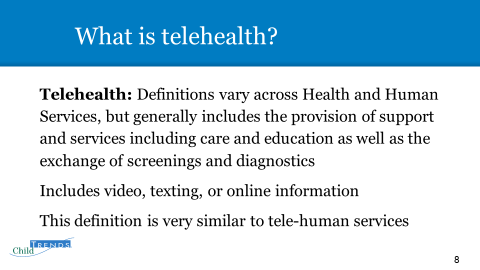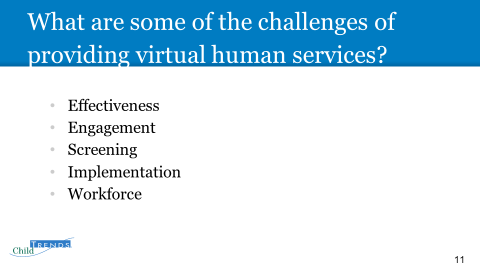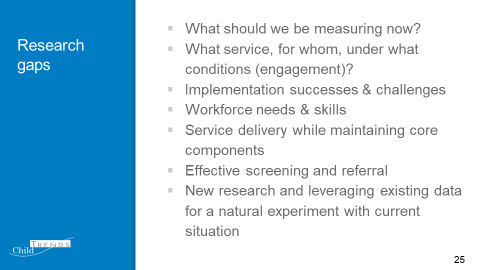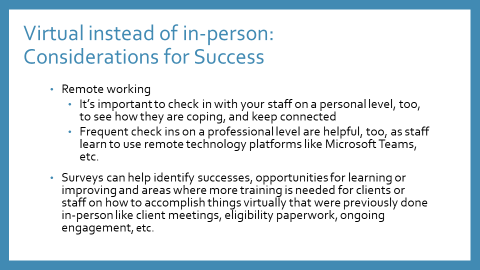- Joe Raymond, Lauren Supplee, and Gerrie Cotter
- April 28 2020
- W66-2020
- Link to W66-2020-Virtual-Case-Management-slides (PDF)



To limit viral transmission during the COVID-19 pandemic, government and public health officials have asked the public to engage in physical distancing. In response, many human services agencies are closing their offices and providing services in other ways, such as online and over the telephone. This is a challenge for fields where services are often delivered face to face. Many human services organizations are quickly trying to establish or scale up virtual case management systems. At the same time, because of the economic challenges accompanying the pandemic, many agencies are seeing a sharp increase in service demand. The urgency and complexity of this situation will require sustained attention and ongoing innovation.
In this webinar recording of an event IRP held in partnership with the U.S. Department of Health and Human Services Office of the Assistant Secretary for Planning and Evaluation, Joe Raymond, Lauren Supplee, and Gerrie Cotter cover a range of considerations for undertaking successful virtual case management in human services programs, including: access to and use of technology; privacy concerns; and virtual interactions such as home visits, and eligibility and enrollment processes.
Recording of the Webinar
Highlights from the Webinar
Telehealth and Human Service Research
Telehealth is the use of electronic information and telecommunications technologies to provide long-distance clinical health care, patient and professional health-related education, and public health and health administration.
The same strategies can be applied to human services, although the closest body of research applicable to human services is within parenting programs, early intervention services, and services reaching remote families, as in tribal communities.
Challenges of Providing Virtual Human Services
Most research on telehealth has found impacts of various telehealth options to be the same or better than in-person services. For example, in evidence-based parenting program interactive video visits, adding texting support and use of online content in conjunction with coaching has led to improved child and parent outcomes. Virtual home visiting services have led to higher parent engagement and program satisfaction.
Research is limited on how to do screenings, effectively build rapport, coaching strategies, or effective means for conveying information in the telehealth environment. Privacy is a concern for both providers and clients. Some evidence suggests that the workforce likes telehealth options and would continue using them because they facilitate connecting with parents and are easy to fit into their schedules.
Research Gaps
Research gaps in the area of virtual home services include implementation, documenting successes and challenges, identifying any data sets that might exist containing before and after pandemic data, identifying what services and what populations are best served by utilizing telehealth options, what are the workforce needs, and how to maintain the effectiveness of services in the telehealth environment.
Virtual Instead of In Person: Considerations for Success
Success in transitioning to virtual from in-person service provision can depend on training, the topic, the learner, comfort with technology, strength of internet connection, and access to equipment. Success is also dependent on effective surveying of clients and training providers and other stakeholders regarding their experiences. Working in virtual environments requires vigilance in monitoring client progress and outcomes.
Virtual Instead of In Person: Considerations for Success, (cont.)
Managers should check in frequently with staff regarding the challenges they may be facing working in a home environment, what their needs are for working remotely, and how they are coping personally and professionally.
Categories
Child Support, Children, Children General, Economic Support, Economic Support General, Employment, Family & Partnering, Family & Partnering General, Food & Nutrition, Food Assistance, Health, Health Care, Housing, Housing Assistance, Inequality & Mobility, Inequality & Mobility General, Justice System, Justice System General, Place, Place General, Unemployment/Nonemployment



